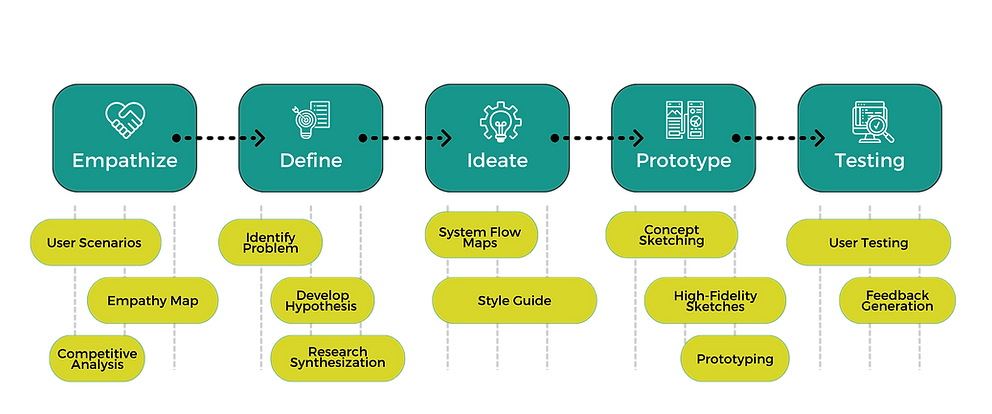
SUMMARY
A mobile health app making specialized medical care accessible.
This case study is a concept of a mobile health app designed to make a highly specialized area of care more accessible to patients managing related symptoms. The app is a way to help women (assigned female at birth), manage the complexities of hormonal health and balance according to their specific goals.
Team
Chyna Miller
(Solo)
Role
Project Lead, User Experience Research, Wireframes, UI Design, Brand Design
Duration
4 weeks
WHAT'S THE PROBLEM?
Many women find it difficult to manage their hormone levels alone.
Hormonal homeostasis is an essential part of our health and daily living. If unbalanced, it can cause unpleasant and sometimes dangerous side effects. Hormonal imbalances in women assigned as female at birth are known to lead to heart conditions, infertility, mental disorders, and more.
.png)
LET'S SEE IF THERE'S A SOLUTION...
How might we help streamline symptom and treatment management?
There is no straight path to managing hormonal imbalance in traditional Western medicine. Additionally, patients may seek alternative treatment in naturopathic and Eastern medical practices. Hermony helps to manage self-directed and practitioner-provided treatment plans that best fit the needs of and empowers the individual patient.
%20(1).png)
RESEARCH PROCESS
My process looked a little something like this...
%20(2).png)
Before we look into a solution let's find out more about the problem...
First, we need to understand that there are multiple diagnoses that can result from hormonal imbalances. These are only a few...
1.
Polycystic Ovary Syndrome (PCOS)
Women with PCOS may not ovulate, have high levels of androgens, and have many small cysts on the ovaries. PCOS can cause missed or irregular menstrual periods, excess hair growth, acne, infertility, and weight gain.
- Johns Hopkins Medicine
2.
Premature Ovarian Insufficiency (POI)
Primary ovarian insufficiency is the depletion or dysfunction of ovarian follicles with cessation of menses before age 40 years. In other words, a woman's ovaries stop working before the typical age or menopause, which may lead to other health complications later in life such as osteoporosis and heart issues.
- American Medical Association
3.
Primary & Secondary Amenorrhea
Amenorrhea is the absence of menstrual periods. There are two types of amenorrhea: Primary amenorrhea—This is when a girl does not get her first period by age 15. Secondary amenorrhea—This is when a woman who already menstruates does not get her period for 3 months or more.
- American Congress of Obstetricians and Gynecologists
Research on the use of Period Tracker Apps
Surveys
Surveys were distributed using Qualtrics.
Are you currently subscribed to any women's health apps?
How often do you track your cycle or period?
%20(15).png)
%20(16).png)
60% responded yes.
40% responded no.
47% responded regularly.
30% responded sometimes.
19% responded seldom.
4% responded never.
On a scale of 1 - 5 (5 being very well), how well do you understand hormonal health?
How often do you feel stressed managing your hormonal health?
%20(17).png)
27% responded 2.
%20(18).png)
15% responded 3.
14% responded 4.
9% responded 5.
35% responded 1.
57.1% responded always.
19.3% responded oftten.
12.6% responded sometimes.
7.6% responded rarely.
3.4% responded never.
Do you feel you have a good understanding of your reproductive health status?
Do you feel your current women's health app is effective in managing your reproductive health?
%20(20).png)
21.7% responded yes.
14.2% responded maybe.
64.2% responded no.
%20(21).png)
61.8% responded no.
27% responded yes.
11.2% responded maybe.
Key Insights
Most users already utilize some reproductive apps but find that most do not include tools for optimizing hormonal health.
A general understanding of hormonal health is lacking among users.
Users feel stressed from managing symptoms and treatment and feel that current apps do not effectively assist with this.
.png)

.png)
I wanted to understand how and why the user would want or need a product like Hermony. The following are the types of users Hermony would be best-suited for.
Personas.
%20(7).png)
Empathy map:
%20(10).png)
-
I don't have time to research this on my own. I'm running out of options and time.
SAYS:
-
Did I cause this? Will I get better? Will I get the answers/outcome I desire?
THINKS:
-
Gets overwhelmed with Information. Has analysis paralysis. Accepts answers from only one specialist.
DOES:
-
Feels defeated and confused. Loses hope in the situation.
FEELS:
%20(4).png)
Empathy map:
%20(10).png)
-
I have too much on my plate, but I need answers.
SAYS:
-
Did my stress cause this? How will I manage this? Will I have to drop out to get better?
THINKS:
-
Does research on her own to find answers. Catastophizes situation.
DOES:
-
Fear / Anxiety / Pressure
FEELS:
%20(11).png)
Empathy map:
%20(10).png)
-
I should be able to manage various treatment plans in one place.
SAYS:
-
There are too many moving pieces. Is anything actually working? Am I on the right track?
THINKS:
-
Over analyzes symptoms, test results, etc. to try to come up with her own answers.
DOES:
-
Feels anxious about the process and afraid of negative outcomes.
FEELS:
DESIGN & IDEATION

If managing symptoms and treatment of hormonal imbalance-related diseases is inefficient across medical practices...
How might we help patients manage varying diagnoses and symptoms with ease?
Improve accessibility to specialized treatment: Most diagnoses related to hormonal imbalances and reproductive health require a treatment plan with multiple practitioners. Developing a tool where all related providers are easily accessible would be beneficial.
Streamline organization and treatment planning: There is no one size fits all treatment plan when it comes to hormone balancing and reproductive health tracking. Patients will often need to manage treatments from various types of providers. A tool to help plan, schedule, and organize each category of treatment would help optimize health.
Symptom tracking: Journaling what's happening in between doctor's visits or treatment sessions can help track progress and keep an eye out for any changes.
User Journey.
We will look at a user's journey from opening the app to operating one of the app's main features, choosing and scheduling an appointment with the appropriate provider.

Lo-fi Sketches.
Handdrawn wireframes using ProCrerate.
%20(12).png)
%20(13).png)
%20(14).png)
Wireframes.
High fidelity wireframes were designed using Figma.
.png)
Visual Design
Final designs were created using Figma, Adobe Illustrator, and Adobe Photoshop.
Onboarding
The onboarding process introduces users to the app, allows users to create a profile, and decide their desired level of engagement.




Treatment Management
Patients are able to select providers based on their individual needs, preferences, and recommended treatment plans.


Patients can choose a provider based on individual goals...
.png)


View information on the provider/practice and schedule a visit right from the app!
Settings & Features
Users can upload medical records (HIPPA compliant), view recommended OTC products and journal symptoms.




Style Guide.
Styling options were based on visual design theory principles which included color theory, shape design theory, and intentional typography.
Colours.
Primary
#17968B
#494949
#FAFAFA
Secondary
#D8D628
#D1ADCD
#EADFCE
Teal represents optimism, mental balance, and femininity.
Neutral colors represent simplicity, sophistication and cleanliness.
Yellow evokes feelings of joy and cheeriness.
Pink represents harmony and innere peace.
Brown evokes reliability and dependability.
.png)
Typography.
.png)
The use of the header serif font represents a stable, established, and formal tone. Given the sensitivity of the purpose of utilization of the app, users need to feel that this product is both reliable in function and the information it provides.
Iconography.
Profile & Settings

Health Status





%20(10).png)
Input Fields

.png)
.png)